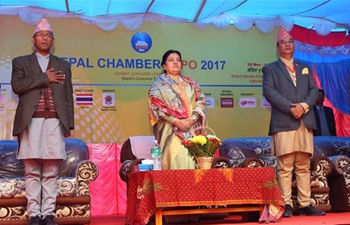SAN FRANCISCO, Nov. 30 (Xinhua) -- U.S. Stanford University announced Thursday that it is cooperating with Apple Inc. to perform a heart study that may help Apple users be alerted about early signs of a heart disease.
Stanford Medicine, a medical arm of Silicon Valley-based Stanford University that is committed to medical education, research and health care, said in a press release that it is working with Apple on the research that uses an Apple Watch app to detect signs that a user may be experiencing abnormal heart rhythms.
The Apple Heart Study app, which was launched by Apple Thursday and available to users in the United States, will use Apple Watch's heart rate sensor to gather data on irregular heart rhythms and notify users who may be experiencing atrial fibrillation (AFib).
AFib, the leading cause of stroke, is responsible for approximately 130,000 deaths and 750,000 hospitalizations in the United States every year, Apple said in a press release on Thursday.
"Many people don't experience symptoms, so AFib often goes undiagnosed," it said.
If an irregular heart rhythm is observed, users wearing Apple Watch will receive a notification on the device and iPhone, "a free consultation with a study doctor and an electrocardiograph patch for additional monitoring," Stanford Medicine said.
The sensor in the Apple Watch uses LED lights to measure heart rate and monitor the pattern of the heartbeat.
The in-built sensor also uses "light-sensitive photodiodes" to detect the amount of blood flowing through the wearer's wrist, collecting signals from four separate points.
The watch depends on certain algorithms to isolate heart rhythms from other "noise," thus identifying an irregular heart rhythm.
"Through the Apple Heart Study, Stanford Medicine faculty will explore how technology like Apple Watch's heart-rate sensor can help usher in a new era of proactive health care central to our precision health approach," said Lloyd Minor, dean of the School of Medicine of Stanford University.

















